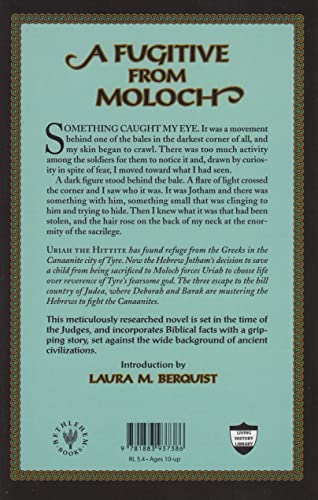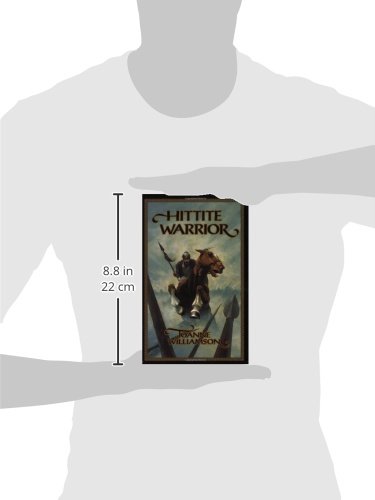معلومات عنا
دعم العملاء
احصل على التطبيق

قم بتوجيه الكاميرا لتنزيل التطبيق
حقوق الطبع والنشر © 2024 Desertcart Holdings Limited




Full description not available
A**Y
Son loved this book.
Because of this and other similar books, my son has developed a love of history.
C**G
Ancient History is Exciting
When 13-year-old Uriah Tarhund and his father travel to Hattusas to deliver a gift a to the king, Uriah's emotions are mixed. The joy and excitement of his first trip to the "city" are tempered by his grief over saying good-bye to Labarnash, the horse he has raised, trained and loved — the horse that is the Hittite's family's gift to the king.Little does Uriah know that this act of gift-giving will save his life. If the young man and his father had been at home, they likely would not have fared better than Uriah's mother and sister, who are killed when the Sea People (raiders from Crete) invade and destroy their homestead.Uriah is the title character and narrator of Hittite Warrior, a work of historical fiction by Joanne Williamson. Her exciting story is set around 1200 BC and explores the very different worlds of the Hittites, the Canaanites of Tyre and Harosheth, the Hebrews, and the Egyptians.Three years after Uriah and his father arrive home to find their lives destroyed and themselves virtually enslaved to their Cretan conquerers, Uriah's father rebels and is killed. Before breathing his last, he tells Uriah to travel to Harosheth and seek out Sisera, a man who owes Uriah's father his life.Uriah eventually gets to Harosheth and meets Sisera, but not before he saves the life of a merchant from Tyre, who then takes the Hittite into his home. Also living with the merchant is a Jewish relative from Ephraim and a grandmother from Egypt. This introduction to foreign cultures is just the beginning of an adventure that will leave Uriah at the mercy of many people — people he thought he should hate because the Hittites had always believed them to be evil.Williamson's story is very good, peopled with interesting characters and filled with harrowing situations, intrigue, and gripping battle scenes. Williamson's two greatest accomplishments are creating a main character we come to care for as we watch him grow emotionally and intellectually, and making ancient history — including the Old Testament story of Deborah, from the Book of Judges — come to life.A word of caution: the book, aimed at children aged 10 and up, deals with the subject of child sacrifices to the god Moloch, and this may be a bit much for some children to handle.
A**R
Nice story, lousy writing
The basic idea and plot of this book is really neat. The story is set in the Biblical time of the Judges before Israel had a king. We are introduced to a Hittite youth living in the Mediterranean about the time that Greeks, particularly those from Crete, were gaining ascendancy. The Hittites as a people are conquered and become fugitives. Our protagonist flees first to the Phoenicians and then into the hills of Judea, where he meets Deborah, the prophetess, and Berek, the Israelite general who is to defeat Sisera. He ends up fighting in the battle on the wrong side, but eventually marries a Israelite woman and settles down in the area.On the way, we are introduced to all kinds of Hittite, Phoenician, Israelite, and Canaanite customs. We learn about their dress, their gods (particularly the dreadful Moloch), their methods of fighting, their habits of enslaving captive peoples, and so on. The book has obviously been carefully researched, and the plot is plausible and interesting.I give the book three stars because the writing is terrible. The fact that the book is for children does not excuse this. Sentences are frequently awkward in construction, and the book reads like a first draft. For instance, the writer will say something like, "The warrior rushed towards me, and I hit him with a stick that I had picked up several moments ago before he attacked me." That's a paraphrase, but you see what I mean. Why on earth weren't we told about the stick BEFORE the warrior rushed towards him? It's as thought the writer just thought of the weapon, and instead of putting the event in it's proper place, she flings it in as an afterthought. This kind of sloppy editing occurs throughout the text. As imaginative fiction, it's great, but this book is NOT a good example for kids to follow in style, editing, or structure.
S**S
Accurate, but...
Maybe I shouldn't review just yet because I'm not totally sure how I feel about this book. It is historically accurate and does a good job of showing the different peoples and cultures of the time, not to mention the fear and confusion of so many deities and ways of worship--some truly horrific. I'd rate it higher than a 3 for that, especially since there aren't that many books that can "put you there" in this time period. As someone else has mentioned, however, the writing is in bad form, leaving much to be desired in that department, so I have to dock it.I guess I should blame myself for this next part--after all, it's a book about a "warrior"--but I didn't expect it to be so violent and in some places gory. I assumed, based on reviews of other mothers having read this with their children, that while there was action and battle, there wouldn't be images described like throats being slit and blood gurgling out. I'm not super happy I read that to my kids.I can't say that I "liked" the book, but that could be because I don't like what was really going on. That's not the book's fault since it all did happen. I'm not one to bury my head in the sand, but I don't relish this stuff, either. So, while I wouldn't shoot the messenger, I'd have liked a better heads up before purchasing than reviews that say simply, "It puts you in the action!"
C**.
Nice integration of histories of different civilizations, seen through the eyes of a Hittite
I liked that a map was included, although it should have been more detailed. A few illustrations , e.g. how Hattusa and Tyre looked like, and the Judge Debora, etc. would have made it more attrcactive. youngsters are nowadays very oriented towards visuals.
E**M
This book is so amazing. it captures the imagination of young readers (even ...
This book is so amazing. it captures the imagination of young readers (even when it is being read out to them). I also love the way it brings home the idea of a God you cannot see when all the other gods around are physical. It really brings to life the every day world of that time too And my young son (about 10 or so at the time) was able to help Grandma with the last question on the big Times Crossword that offered a prize! She just asked outloud who was the god of some tribe or other (i honestly cannot remember) and my young son just piped up with the correct answer much to everyone's amazement.The descriptions are so vivid i still can picture Deborah the judge and prophetess sitting beneath her treei highly recommend this to everyone who is interested in ancient history.
ترست بايلوت
منذ شهرين
منذ أسبوعين